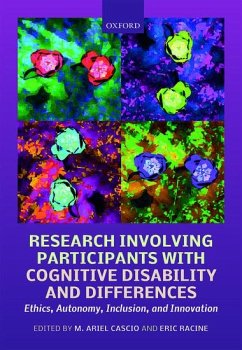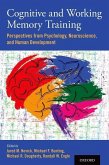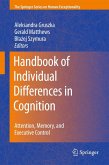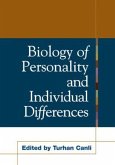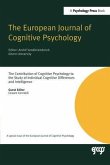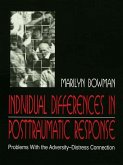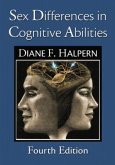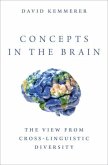Research Involving Participants with Cognitive Disability and Differences
Ethics, Autonomy, Inclusion, and Innovation
Herausgeber: Cascio, M Ariel; Racine, Eric
Research Involving Participants with Cognitive Disability and Differences
Ethics, Autonomy, Inclusion, and Innovation
Herausgeber: Cascio, M Ariel; Racine, Eric
- Gebundenes Buch
- Merkliste
- Auf die Merkliste
- Bewerten Bewerten
- Teilen
- Produkt teilen
- Produkterinnerung
- Produkterinnerung
Research participants who have cognitive disabilities and differences may be considered a vulnerable population. This volume provides multidisciplinary insights into the ethical aspects of research that includes these populations, including conditions such as intellectual disability, autism, mild cognitive impairment, and psychiatric diagnoses.
Andere Kunden interessierten sich auch für
![Cognitive and Working Memory Training Cognitive and Working Memory Training]() Cognitive and Working Memory Training146,99 €
Cognitive and Working Memory Training146,99 €![Handbook of Individual Differences in Cognition Handbook of Individual Differences in Cognition]() Aleksandra Gruszka / Gerald Matthews / Blazej Szymura (Hrsg.)Handbook of Individual Differences in Cognition148,99 €
Aleksandra Gruszka / Gerald Matthews / Blazej Szymura (Hrsg.)Handbook of Individual Differences in Cognition148,99 €![Biology of Personality and Individual Differences Biology of Personality and Individual Differences]() Biology of Personality and Individual Differences99,99 €
Biology of Personality and Individual Differences99,99 €![The Contribution of Cognitive Psychology to the Study of Individual Cognitive Differences and Intelligence The Contribution of Cognitive Psychology to the Study of Individual Cognitive Differences and Intelligence]() The Contribution of Cognitive Psychology to the Study of Individual Cognitive Differences and Intelligence202,99 €
The Contribution of Cognitive Psychology to the Study of Individual Cognitive Differences and Intelligence202,99 €![Individual Differences in Posttraumatic Response Individual Differences in Posttraumatic Response]() Marilyn L BowmanIndividual Differences in Posttraumatic Response189,99 €
Marilyn L BowmanIndividual Differences in Posttraumatic Response189,99 €![Sex Differences in Cognitive Abilities Sex Differences in Cognitive Abilities]() Diane F HalpernSex Differences in Cognitive Abilities200,99 €
Diane F HalpernSex Differences in Cognitive Abilities200,99 €![Concepts in the Brain Concepts in the Brain]() David KemmererConcepts in the Brain146,99 €
David KemmererConcepts in the Brain146,99 €-
-
-
Research participants who have cognitive disabilities and differences may be considered a vulnerable population. This volume provides multidisciplinary insights into the ethical aspects of research that includes these populations, including conditions such as intellectual disability, autism, mild cognitive impairment, and psychiatric diagnoses.
Hinweis: Dieser Artikel kann nur an eine deutsche Lieferadresse ausgeliefert werden.
Hinweis: Dieser Artikel kann nur an eine deutsche Lieferadresse ausgeliefert werden.
Produktdetails
- Produktdetails
- Verlag: Oxford University Press
- Seitenzahl: 304
- Erscheinungstermin: 5. November 2019
- Englisch
- Abmessung: 249mm x 173mm x 23mm
- Gewicht: 726g
- ISBN-13: 9780198824343
- ISBN-10: 0198824343
- Artikelnr.: 55875198
- Herstellerkennzeichnung
- Libri GmbH
- Europaallee 1
- 36244 Bad Hersfeld
- 06621 890
- Verlag: Oxford University Press
- Seitenzahl: 304
- Erscheinungstermin: 5. November 2019
- Englisch
- Abmessung: 249mm x 173mm x 23mm
- Gewicht: 726g
- ISBN-13: 9780198824343
- ISBN-10: 0198824343
- Artikelnr.: 55875198
- Herstellerkennzeichnung
- Libri GmbH
- Europaallee 1
- 36244 Bad Hersfeld
- 06621 890
M. Ariel Cascio, PhD, is a postdoctoral researcher at the Pragmatic Health Ethics Research Unit of the Institut de recherches cliniques de Montréal with a Ph.D. in Anthropology from Case Western Reserve University. Cascio's research focuses on social and ethical issues related to autism, including developing guidelines for person-oriented autism research ethics through a collaborative project with autistic self-advocates, parents, researchers, professionals, and advocacy organization representatives. Eric Racine, PhD, is Director of the Pragmatic Health Ethics Research Unit and Full Research Professor at the Institut de recherches cliniques de Montréal (IRCM), Canada with joint appointments at the Université de Montréal and McGill University. Inspired by philosophical pragmatism, his research aims to understand and bring to the forefront the experience of ethically problematic situations encountered by patients and stakeholders in order to resolve them collaboratively through deliberative and evidenced-informed processes. He has published over 150 peer reviewed publications in leading journals in the social sciences (e.g., Social Science & Medicine; Public Understanding of Science), bioethics (e.g., Bioethics, American Journal of Bioethics), neuroscience (e.g., Pain, Neuron, Nature Reviews Neuroscience), and clinical medicine and neurology (e.g., Neurology, Lancet Neurology).
* Section I: Conceptual Frameworks
* 1: Ongoing consent in situations of cognitive vulnerability: Special
considerations in implanted neural device trials,^lLauren Sankary and
Paul Ford
* 2: Who Decides? Legal Changes to Facilitate Inclusion of Participants
with Impaired Cognition in Research,Megan Wright
* 3: Differing Understandings of Informed Consent Held by Research
Institutions, People with Intellectual Disability, and Guardians:
Implications for Inclusive, Ethical Research,Britteny Howell and
Karrie Shogren
* 4: Research Cohorts: Diverse Research Subjects, Similar Remedies to
Errors in Consent,Deborah Barnbaum
* 5: Autism, Autonomy, and Research,Kenneth A Richman
* Section II: Challenges
* 6: Disability, Vulnerability, and the Capacity to Consent,Stephanie
Patterson and Pamela Block
* 7: REB/IRB Variability and Other Ethical Challenges in Multi-site
Research Involving Participants on the Autism Spectrum,Mackenzie Salt
* 8: Bridging worlds: can anthropology be a communicational therapy?,
Leonardo Campoy
* 9: Challenges of Participating in Research about Living with MCI
among Disabled Veterans,Christine Schneider and Eva Kahana
* 10: Mediators of Inclusion: Challenges to Including Adults with Mild
Intellectual Disability in Qualitative Research,Vanessa Cox, Treena
Orchard, Pamela Cushing, and Elizabeth Anne Kinsella
* 11: Shifting Identities: Research on Macro and Micro Aspects of ID
College Programs,Jack Trammell
* Section III: Successes
* 12: Recognizing the voices of children with 'cognitive impairments'
in research,Marjorie Montreuil, Gail Teachman, and Franco Carnevale
* 13: Informed consent for closed-loop DBS psychiatric research:
Engaging end users to understand risks and improve practice,Eran
Klein
* 14: Using Ethnographic Methods to Determine Capacity to Consent
amongst Individuals Diagnosed with Chronic Mental Illnesses,Saira A.
Mehmood
* 15: Making research more ethical for adults with FASD: A story of
stakeholder engagement, accommodation, and inclusion,John Aspler
* 16: A conversation with research ethics boards about inclusive
research with persons with intellectual and developmental
disabilities,Virginie Cobigo, Lynne A. Potvin, Casey Fulford, Hajer
Chalghoumi, Mariam Hanna, Natasha Plourde, and Whitney Taylor
* 17: Assuming Capacity: Ethical Participatory Research with
Adolescents and Adults with Down Syndrome,Anne Kohler
* Section IV: Commentaries
* 18: Are Patients with Psychiatric Disorders Laura Dunn and Paul
Holzheimer
* 19: Ongoing Consent for the Inverse Problematic to Loss of Capacity:
Commentary on Sankary and Ford (Chapter 1),Caitlin Courchesne and
Judy Illes
* 20: Differing Understandings of Informed Consent: Commentary on
Howell and Shogren (Chapter 3),Jack Trammell
* 21: The Mindset of Surrogates and Inclusivity Research: Commentary on
Howell and Shogren (Chapter 3),Deborah Barnbaum
* 22: Drawing Distinctions Among Different Types of Research on Persons
with Autism: Commentary on Richman (Chapter 5),Deborah Barnbaum
* 23: A Critical Lens on Disability and Consent: Commentary on
Patterson and Block (Chapter 6) and on Mehmood (Chapter 14),Allison
Bloom
* 24: Repurposing Ethnography to Assess Consent Capacity: Commentary on
Mehmood (Chapter 14),Megan Wright
* 25: Using Ethnographic Methods: Commentary on Mehmood (Chapter 14),
Jack Trammell
* 26: Joining Voices: Commentary on Kohler (Chapter 17),Anne Kohler and
Ben Majewski
* 27: What Stories Tell? In Praise of Anthropology: Commentary on
Kohler (Chapter 17),Leonard Campoy
* 28: Melissa Park and Donald Fogelberg
* 29: Toward a Research Ethics Culture of Inclusion and Participation:
Commentary on All Chapters,Eric Racine
* 30: Vulnerability, Empowerment, and Dissent-The Importance of Saying
No: Commentary on All Chapters,M. Ariel Cascio
* 1: Ongoing consent in situations of cognitive vulnerability: Special
considerations in implanted neural device trials,^lLauren Sankary and
Paul Ford
* 2: Who Decides? Legal Changes to Facilitate Inclusion of Participants
with Impaired Cognition in Research,Megan Wright
* 3: Differing Understandings of Informed Consent Held by Research
Institutions, People with Intellectual Disability, and Guardians:
Implications for Inclusive, Ethical Research,Britteny Howell and
Karrie Shogren
* 4: Research Cohorts: Diverse Research Subjects, Similar Remedies to
Errors in Consent,Deborah Barnbaum
* 5: Autism, Autonomy, and Research,Kenneth A Richman
* Section II: Challenges
* 6: Disability, Vulnerability, and the Capacity to Consent,Stephanie
Patterson and Pamela Block
* 7: REB/IRB Variability and Other Ethical Challenges in Multi-site
Research Involving Participants on the Autism Spectrum,Mackenzie Salt
* 8: Bridging worlds: can anthropology be a communicational therapy?,
Leonardo Campoy
* 9: Challenges of Participating in Research about Living with MCI
among Disabled Veterans,Christine Schneider and Eva Kahana
* 10: Mediators of Inclusion: Challenges to Including Adults with Mild
Intellectual Disability in Qualitative Research,Vanessa Cox, Treena
Orchard, Pamela Cushing, and Elizabeth Anne Kinsella
* 11: Shifting Identities: Research on Macro and Micro Aspects of ID
College Programs,Jack Trammell
* Section III: Successes
* 12: Recognizing the voices of children with 'cognitive impairments'
in research,Marjorie Montreuil, Gail Teachman, and Franco Carnevale
* 13: Informed consent for closed-loop DBS psychiatric research:
Engaging end users to understand risks and improve practice,Eran
Klein
* 14: Using Ethnographic Methods to Determine Capacity to Consent
amongst Individuals Diagnosed with Chronic Mental Illnesses,Saira A.
Mehmood
* 15: Making research more ethical for adults with FASD: A story of
stakeholder engagement, accommodation, and inclusion,John Aspler
* 16: A conversation with research ethics boards about inclusive
research with persons with intellectual and developmental
disabilities,Virginie Cobigo, Lynne A. Potvin, Casey Fulford, Hajer
Chalghoumi, Mariam Hanna, Natasha Plourde, and Whitney Taylor
* 17: Assuming Capacity: Ethical Participatory Research with
Adolescents and Adults with Down Syndrome,Anne Kohler
* Section IV: Commentaries
* 18: Are Patients with Psychiatric Disorders Laura Dunn and Paul
Holzheimer
* 19: Ongoing Consent for the Inverse Problematic to Loss of Capacity:
Commentary on Sankary and Ford (Chapter 1),Caitlin Courchesne and
Judy Illes
* 20: Differing Understandings of Informed Consent: Commentary on
Howell and Shogren (Chapter 3),Jack Trammell
* 21: The Mindset of Surrogates and Inclusivity Research: Commentary on
Howell and Shogren (Chapter 3),Deborah Barnbaum
* 22: Drawing Distinctions Among Different Types of Research on Persons
with Autism: Commentary on Richman (Chapter 5),Deborah Barnbaum
* 23: A Critical Lens on Disability and Consent: Commentary on
Patterson and Block (Chapter 6) and on Mehmood (Chapter 14),Allison
Bloom
* 24: Repurposing Ethnography to Assess Consent Capacity: Commentary on
Mehmood (Chapter 14),Megan Wright
* 25: Using Ethnographic Methods: Commentary on Mehmood (Chapter 14),
Jack Trammell
* 26: Joining Voices: Commentary on Kohler (Chapter 17),Anne Kohler and
Ben Majewski
* 27: What Stories Tell? In Praise of Anthropology: Commentary on
Kohler (Chapter 17),Leonard Campoy
* 28: Melissa Park and Donald Fogelberg
* 29: Toward a Research Ethics Culture of Inclusion and Participation:
Commentary on All Chapters,Eric Racine
* 30: Vulnerability, Empowerment, and Dissent-The Importance of Saying
No: Commentary on All Chapters,M. Ariel Cascio
* Section I: Conceptual Frameworks
* 1: Ongoing consent in situations of cognitive vulnerability: Special
considerations in implanted neural device trials,^lLauren Sankary and
Paul Ford
* 2: Who Decides? Legal Changes to Facilitate Inclusion of Participants
with Impaired Cognition in Research,Megan Wright
* 3: Differing Understandings of Informed Consent Held by Research
Institutions, People with Intellectual Disability, and Guardians:
Implications for Inclusive, Ethical Research,Britteny Howell and
Karrie Shogren
* 4: Research Cohorts: Diverse Research Subjects, Similar Remedies to
Errors in Consent,Deborah Barnbaum
* 5: Autism, Autonomy, and Research,Kenneth A Richman
* Section II: Challenges
* 6: Disability, Vulnerability, and the Capacity to Consent,Stephanie
Patterson and Pamela Block
* 7: REB/IRB Variability and Other Ethical Challenges in Multi-site
Research Involving Participants on the Autism Spectrum,Mackenzie Salt
* 8: Bridging worlds: can anthropology be a communicational therapy?,
Leonardo Campoy
* 9: Challenges of Participating in Research about Living with MCI
among Disabled Veterans,Christine Schneider and Eva Kahana
* 10: Mediators of Inclusion: Challenges to Including Adults with Mild
Intellectual Disability in Qualitative Research,Vanessa Cox, Treena
Orchard, Pamela Cushing, and Elizabeth Anne Kinsella
* 11: Shifting Identities: Research on Macro and Micro Aspects of ID
College Programs,Jack Trammell
* Section III: Successes
* 12: Recognizing the voices of children with 'cognitive impairments'
in research,Marjorie Montreuil, Gail Teachman, and Franco Carnevale
* 13: Informed consent for closed-loop DBS psychiatric research:
Engaging end users to understand risks and improve practice,Eran
Klein
* 14: Using Ethnographic Methods to Determine Capacity to Consent
amongst Individuals Diagnosed with Chronic Mental Illnesses,Saira A.
Mehmood
* 15: Making research more ethical for adults with FASD: A story of
stakeholder engagement, accommodation, and inclusion,John Aspler
* 16: A conversation with research ethics boards about inclusive
research with persons with intellectual and developmental
disabilities,Virginie Cobigo, Lynne A. Potvin, Casey Fulford, Hajer
Chalghoumi, Mariam Hanna, Natasha Plourde, and Whitney Taylor
* 17: Assuming Capacity: Ethical Participatory Research with
Adolescents and Adults with Down Syndrome,Anne Kohler
* Section IV: Commentaries
* 18: Are Patients with Psychiatric Disorders Laura Dunn and Paul
Holzheimer
* 19: Ongoing Consent for the Inverse Problematic to Loss of Capacity:
Commentary on Sankary and Ford (Chapter 1),Caitlin Courchesne and
Judy Illes
* 20: Differing Understandings of Informed Consent: Commentary on
Howell and Shogren (Chapter 3),Jack Trammell
* 21: The Mindset of Surrogates and Inclusivity Research: Commentary on
Howell and Shogren (Chapter 3),Deborah Barnbaum
* 22: Drawing Distinctions Among Different Types of Research on Persons
with Autism: Commentary on Richman (Chapter 5),Deborah Barnbaum
* 23: A Critical Lens on Disability and Consent: Commentary on
Patterson and Block (Chapter 6) and on Mehmood (Chapter 14),Allison
Bloom
* 24: Repurposing Ethnography to Assess Consent Capacity: Commentary on
Mehmood (Chapter 14),Megan Wright
* 25: Using Ethnographic Methods: Commentary on Mehmood (Chapter 14),
Jack Trammell
* 26: Joining Voices: Commentary on Kohler (Chapter 17),Anne Kohler and
Ben Majewski
* 27: What Stories Tell? In Praise of Anthropology: Commentary on
Kohler (Chapter 17),Leonard Campoy
* 28: Melissa Park and Donald Fogelberg
* 29: Toward a Research Ethics Culture of Inclusion and Participation:
Commentary on All Chapters,Eric Racine
* 30: Vulnerability, Empowerment, and Dissent-The Importance of Saying
No: Commentary on All Chapters,M. Ariel Cascio
* 1: Ongoing consent in situations of cognitive vulnerability: Special
considerations in implanted neural device trials,^lLauren Sankary and
Paul Ford
* 2: Who Decides? Legal Changes to Facilitate Inclusion of Participants
with Impaired Cognition in Research,Megan Wright
* 3: Differing Understandings of Informed Consent Held by Research
Institutions, People with Intellectual Disability, and Guardians:
Implications for Inclusive, Ethical Research,Britteny Howell and
Karrie Shogren
* 4: Research Cohorts: Diverse Research Subjects, Similar Remedies to
Errors in Consent,Deborah Barnbaum
* 5: Autism, Autonomy, and Research,Kenneth A Richman
* Section II: Challenges
* 6: Disability, Vulnerability, and the Capacity to Consent,Stephanie
Patterson and Pamela Block
* 7: REB/IRB Variability and Other Ethical Challenges in Multi-site
Research Involving Participants on the Autism Spectrum,Mackenzie Salt
* 8: Bridging worlds: can anthropology be a communicational therapy?,
Leonardo Campoy
* 9: Challenges of Participating in Research about Living with MCI
among Disabled Veterans,Christine Schneider and Eva Kahana
* 10: Mediators of Inclusion: Challenges to Including Adults with Mild
Intellectual Disability in Qualitative Research,Vanessa Cox, Treena
Orchard, Pamela Cushing, and Elizabeth Anne Kinsella
* 11: Shifting Identities: Research on Macro and Micro Aspects of ID
College Programs,Jack Trammell
* Section III: Successes
* 12: Recognizing the voices of children with 'cognitive impairments'
in research,Marjorie Montreuil, Gail Teachman, and Franco Carnevale
* 13: Informed consent for closed-loop DBS psychiatric research:
Engaging end users to understand risks and improve practice,Eran
Klein
* 14: Using Ethnographic Methods to Determine Capacity to Consent
amongst Individuals Diagnosed with Chronic Mental Illnesses,Saira A.
Mehmood
* 15: Making research more ethical for adults with FASD: A story of
stakeholder engagement, accommodation, and inclusion,John Aspler
* 16: A conversation with research ethics boards about inclusive
research with persons with intellectual and developmental
disabilities,Virginie Cobigo, Lynne A. Potvin, Casey Fulford, Hajer
Chalghoumi, Mariam Hanna, Natasha Plourde, and Whitney Taylor
* 17: Assuming Capacity: Ethical Participatory Research with
Adolescents and Adults with Down Syndrome,Anne Kohler
* Section IV: Commentaries
* 18: Are Patients with Psychiatric Disorders Laura Dunn and Paul
Holzheimer
* 19: Ongoing Consent for the Inverse Problematic to Loss of Capacity:
Commentary on Sankary and Ford (Chapter 1),Caitlin Courchesne and
Judy Illes
* 20: Differing Understandings of Informed Consent: Commentary on
Howell and Shogren (Chapter 3),Jack Trammell
* 21: The Mindset of Surrogates and Inclusivity Research: Commentary on
Howell and Shogren (Chapter 3),Deborah Barnbaum
* 22: Drawing Distinctions Among Different Types of Research on Persons
with Autism: Commentary on Richman (Chapter 5),Deborah Barnbaum
* 23: A Critical Lens on Disability and Consent: Commentary on
Patterson and Block (Chapter 6) and on Mehmood (Chapter 14),Allison
Bloom
* 24: Repurposing Ethnography to Assess Consent Capacity: Commentary on
Mehmood (Chapter 14),Megan Wright
* 25: Using Ethnographic Methods: Commentary on Mehmood (Chapter 14),
Jack Trammell
* 26: Joining Voices: Commentary on Kohler (Chapter 17),Anne Kohler and
Ben Majewski
* 27: What Stories Tell? In Praise of Anthropology: Commentary on
Kohler (Chapter 17),Leonard Campoy
* 28: Melissa Park and Donald Fogelberg
* 29: Toward a Research Ethics Culture of Inclusion and Participation:
Commentary on All Chapters,Eric Racine
* 30: Vulnerability, Empowerment, and Dissent-The Importance of Saying
No: Commentary on All Chapters,M. Ariel Cascio

